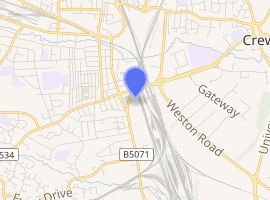Alexandra Recreation Ground
The Alexandra Recreation Ground, also known as Nantwich Road, was a multi-sport venue in Crewe in England. It was the home ground of Crewe Alexandra, and also hosted an England home match, FA Cup semi-final and 1886-87 Welsh Cup final.
Nantwich Road | |

| |
| Location | Crewe, England |
|---|---|
| Coordinates | 53.0884°N 2.4356°W |
| Record attendance | 7,000 |
| Surface | Grass |
| Opened | 1877 |
| Closed | 1896 |
| Tenants | |
| Crewe Alexandra | |
History
The ground was opened in 1877, and was used for athletics, cricket, cycle racing and football. An oval ground, it had a stand around 100 feet long on the western side and banking around the remainder of the pitch.[1]
In the 1886–87 season the ground was the venue of the FA Cup semi-final between Aston Villa and Rangers, with the attendance of 7,000 probably being the ground record. On 16 April 1887 the ground was used for the Welsh Cup final between Chirk and Davenham. An attendance of 1,500 witnessed Chirk win 2-1.[2]
On 4 February 1888 the ground hosted the opening match of the 1887–88 British Home Championship, which saw England beat Wales 5–1. Crewe were founder members of the Football League Second Division in 1892, and the first League match played at the ground saw Crewe defeat Grimsby Town 1–0 in front of 2,000 spectators.[1]
The last match at the ground was played on 28 March 1896, with Liverpool's 7–0 win on the day also being Crewe's record home defeat at the ground. However, it was not Crewe's last home league match of the season, which was played at the Vicarage in the nearby town of Sandbach. Crewe were voted out of the Football League at the end of the 1895–96 season, and subsequently played at several different grounds until returning to the area to play at the original Gresty Road ground in 1897.[1] They later moved to the modern-day Gresty Road ground in 1906.[3]
The Alexandra Recreation Ground is now the site of the Rail House office building, a car park and part of the modern Gresty Road stadium.[1]
References
- Paul Smith & Shirley Smith (2005) The Ultimate Directory of English & Scottish Football League Grounds Second Edition 1888–2005, Yore Publications, p13, ISBN 0954783042
- www.welshsoccerarchive.co.uk https://www.welshsoccerarchive.co.uk/welsh_cup.php?id=10. Retrieved 9 May 2019. Missing or empty
|title=(help) - Smith & Smith, p62